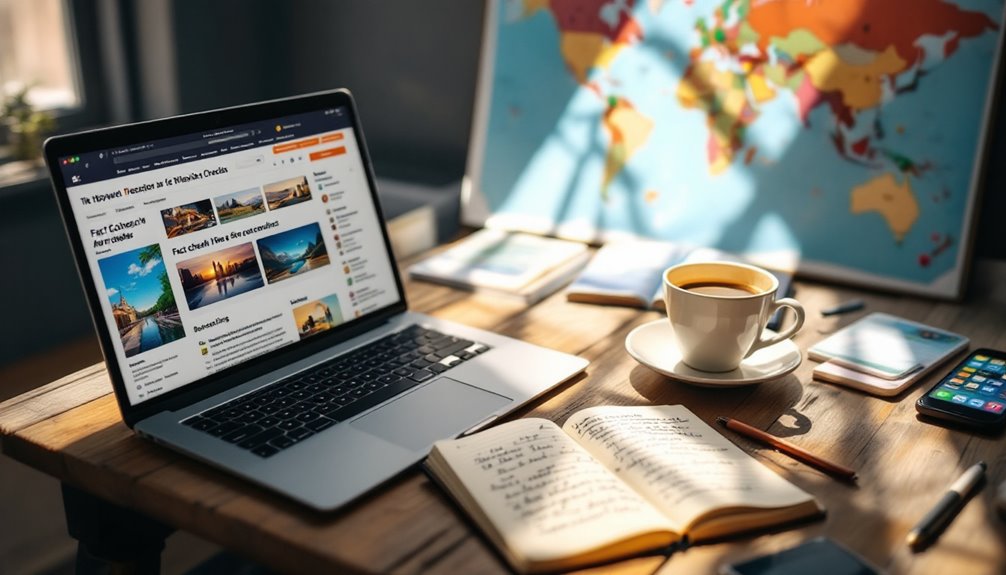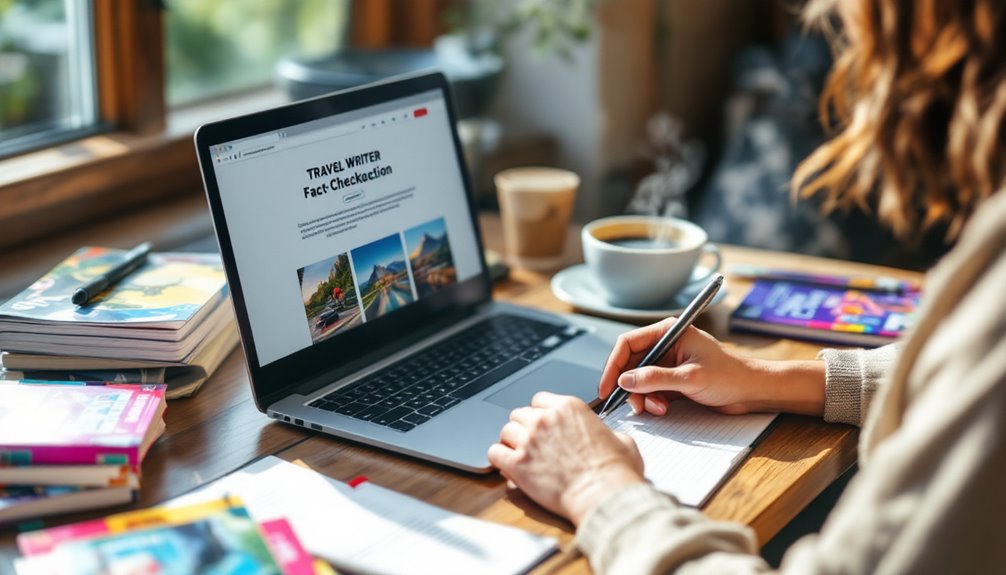Envision planning a trip based on recommendations that turn out to be inaccurate or outdated. You wouldn't want your readers to experience that frustration, would you? Fact-checking is essential for travel writers, ensuring that every detail, from local customs to hotel availability, is spot on. But what exactly goes into this meticulous process, and how can you effectively verify the information to maintain your credibility? Understanding these elements can elevate your work and foster trust with your audience, leading to more impactful storytelling.
Importance of Fact-Checking
Fact-checking is the backbone of credible travel writing. When you dig into the importance dimensions of this practice, it becomes clear how crucial it is to your credibility. Inaccurate information can seriously tarnish your reputation and that of the publication you write for. If readers find your facts wrong, they're quick to share negative reviews, especially in travel writing, where accuracy has major implications for planning their adventures.
You want to build trust with your audience, right? Well, fact-checking is how you do that. It helps guarantee that all details—like names, dates, and locations—are spot on. Plus, if you make bold claims like "the best destination," you'd better have the facts to back it up. Otherwise, you risk misleading your readers, and nobody wants that. Moreover, with the digital age buzzing with misinformation, it's your responsibility to provide truthful content. This not only boosts your standing with readers but also keeps your search engine rankings healthy. So, when you're crafting your next travel piece, remember: accuracy isn't just important; it's critical for your success. To enhance your accuracy, consider utilizing advanced fact-checking tools to verify your information before publication.
Reliable Sources for Verification
To build that trust with your audience, knowing where to find reliable sources for verification is key. When it comes to destination accuracy, official travel websites and government publications should be your first stop. These sources offer up-to-date information, including travel advisories and local guidelines. Always cross-reference data to guarantee it's accurate and reflects any recent changes.
Reputable travel guides like Lonely Planet or Michelin are also a goldmine. Their rigorous fact-checking processes mean you're getting trustworthy content. Plus, they're often updated, keeping pace with shifting travel landscapes. It's wise to check the credentials of the authors too; experience matters!
Don't forget about local experts—tour guides, travel agents, or even local residents can provide insider info that you won't find anywhere else. Tourism boards are another fantastic resource for accurate details about attractions and customs.
For deeper research, consider primary sources like interviews or surveys, and don't overlook secondary sources like academic journals. Evaluating source credibility through author qualifications and peer reviews can make all the difference. Engaging in extensive research will not only enhance your writing but also ensure that the information you present is reliable and well-supported. So, engage in source comparison, and you'll elevate your writing to new heights!
Effective Fact-Checking Process

An effective fact-checking process is essential for any travel writer aiming to deliver accurate and trustworthy content. You should start with thorough research, diving deep into the destination's history, culture, and attractions. Use a mix of sources—official tourism websites, reputable travel guides, and even personal anecdotes—to gather unique perspectives. Don't forget to document everything; transparency is key in developing accuracy.
Next, annotate your drafts with citations for every fact. This includes contact info for experts and details about interviews. Footnotes and comments can link facts to their sources, making it easier to verify your information. If something seems off, flag it and cross-check it against multiple sources. You might even create a rating scale to score your claims, which is a fun way to keep things organized.
Lastly, stay updated! Travel trends change faster than you can say "wanderlust." Attend industry events, collaborate with professionals, and use advanced tools to validate statistics. Remember, the goal is to make your writing not just engaging but also reliable. After all, your words can inspire someone's next adventure! Upholding journalistic standards through diligent verification processes is essential to empower truth-telling while minimizing risks of disenfranchisement.
Engaging Local Experts
Engaging local experts can greatly elevate your travel writing by providing a wealth of accurate, insider information. These knowledgeable folks offer local knowledge that you simply can't find in guidebooks. Whether it's a museum curator, a historian, or a PR director, their insights can help validate historical and cultural details, ensuring your work shines with credibility. Additionally, their expertise can help you showcase the culture, history, and natural beauty of a destination, which is essential for promoting tourism.
Plus, local experts can review your drafts, spotting errors and omissions you might overlook. They often have access to exclusive information—like hidden gems and local events—that'll make your writing stand out. Think of them as your personal tour guides, revealing stories that few tourists ever get to hear.
Their involvement not only enhances the authenticity of your content but also resonates with readers on a personal level. Incorporating local dialects and customs can make your writing more relatable and engaging.
Staying Informed on Updates

Local experts can provide unparalleled insights, but staying informed on the latest developments in the travel industry is equally important for writers. You can achieve this by subscribing to industry publications and newsletters, which often highlight essential updates on travel regulations. Following travel bloggers and influencers on social media not only keeps you in the loop, but it also offers a personal touch to the ever-changing landscape of travel.
Attending conferences and events can be a game-changer. You'll meet fellow writers and industry professionals while soaking in the latest trends. Engaging in online forums and discussions can also spark new ideas and keep you connected to what's happening worldwide. Additionally, being aware of ethical considerations in travel writing can help you navigate these changes responsibly.
Don't forget to read travel news websites and blogs; they're a fantastic resource for monitoring shifts in sustainable tourism and responsible travel practices. Staying curious about new destinations and reflecting on your travel experiences can spark inspiration.
Tools for Verification
When it comes to validating the accuracy of your travel writing, leveraging the right tools for verification can be crucial. You've got a mix of automated tools and manual verification methods at your fingertips. For quick checks, tools like LongShot AI and MyAIFactChecker let you scan your claims against reliable sources. They can save you a lot of time when you're on deadline. Additionally, utilizing tools like AI Content Planner can help you generate tailored content ideas that focus on trending topics, enhancing your overall verification process.
But don't forget about good old-fashioned manual verification! Sending your drafts to experts, like museum curators or PR directors, can help catch those pesky errors. You can also reach out to media representatives from the destinations you're writing about to confirm facts and guarantee accuracy. Plus, a little peer review never hurt anyone—ask your colleagues for their insights!
And don't underestimate the power of resources like academic databases or libraries. They can be gold mines for verifying information. So, whether you're using automated tools or going the manual route, combining these methods will give your travel writing the accuracy it deserves. After all, travelers depend on your words, so be certain they can trust them!
Enhancing Credibility and Trust

Building credibility and trust in your travel writing hinges on your commitment to accuracy and thoroughness. You can enhance your reputation by diving deep into source evaluation. Start with reputable sources like official tourism websites and guidebooks. But don't stop there—explore local archives and independent blogs to gather diverse perspectives. Cross-reference your findings to guarantee everything aligns, and remember to document your sources for easy verification later.
Awareness of bias is equally significant. Always ask yourself who wrote the information and what their motives might be. This doesn't mean you should become a conspiracy theorist, but a little skepticism can go a long way. Engage with local experts and conduct interviews to gather firsthand insights; this not only enriches your writing but also shows readers you've done your homework. Additionally, involving Subject Matter Experts (SMEs) in your research can ensure that the information you present is both current and unbiased.
Lastly, keep your facts straight, from names to dates. Transparency builds trust, so if you make a mistake, own up to it and correct it promptly. By prioritizing accuracy and being mindful of biases, you'll not only inform your readers but also keep them coming back for more. After all, who doesn't love a trustworthy travel guide?
Wrapping up
So, as you start your travel writing journey, remember that fact-checking is your trusty compass in a vast ocean of information. Just like a good map, it'll guide you through the twists and turns of accuracy, ensuring your readers don't end up lost in the wilderness of misinformation. By prioritizing reliable sources and engaging local experts, you're not just telling stories—you're building a bridge of trust. Happy writing, and may your facts always be as solid as a well-pitched tent!